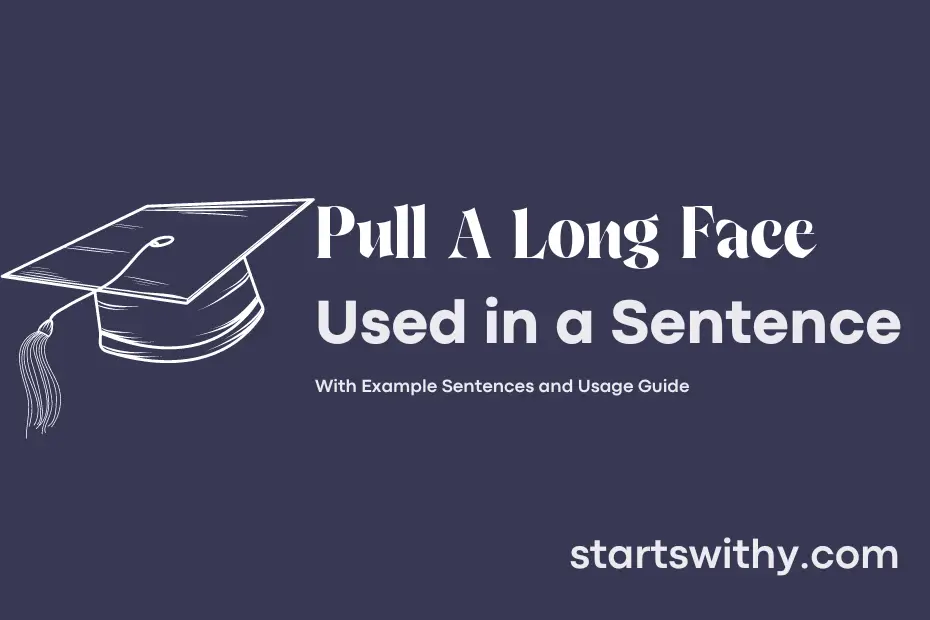Do you know what it means to “pull a long face”? This expression is used to describe someone who is looking sad or disappointed. When someone pulls a long face, their facial expression clearly shows their negative emotions.
Expressions like “pull a long face” are common in English, and understanding their meanings can help you communicate more effectively in daily conversations. Let’s explore more about this expression and how it can be used in different contexts.
7 Examples Of Pull A Long Face Used In a Sentence For Kids
- Riya started to pull a long face when she lost her favorite toy.
- Aarav tends to pull a long face when he doesn’t get his favorite snack.
- Don’t pull a long face if you don’t win the game, just try again!
- It’s common for children to pull a long face when it’s time to go to bed.
- Varun loves to pull a long face if he can’t play with his friends.
- Remember not to pull a long face if things don’t go your way, stay positive!
- Priya often pulls a long face when she has to eat vegetables for dinner.
14 Sentences with Pull A Long Face Examples
- Pulling a long face, the college student realized they forgot their laptop charger at home.
- In the crowded library, many students were seen pulling a long face when they couldn’t find an available study spot.
- After receiving a poor grade on their final exam, the student couldn’t help but pull a long face.
- When the professor announced a surprise quiz, the entire class collectively pulled a long face.
- The student had to pull a long face as they waited in a long line at the college canteen.
- Despite studying all night, the student pulled a long face when they couldn’t recall the answers during the exam.
- The student couldn’t hide their disappointment and pulled a long face after their presentation did not go as planned.
- After losing their notes right before an important presentation, the student couldn’t help but pull a long face.
- While discussing the increased workload for the semester, the student pulled a long face at the thought of impending stress.
- Realizing they missed the deadline to submit their assignment, the student pulled a long face in frustration.
- The student pulled a long face when they found out their favorite professor was on sabbatical for the semester.
- After receiving a hefty parking ticket on campus, the student pulled a long face at the unexpected expense.
- The student couldn’t help but pull a long face when they discovered that the library was closed during exam week.
- Pulling a long face, the student regretted not starting the research paper earlier and now faced a tight deadline.
How To Use Pull A Long Face in Sentences?
To use “Pull A Long Face” in a sentence, follow these steps:
Step 1: Understand the meaning of the phrase. “Pull A Long Face” means to have a sad or disappointed expression on one’s face.
Step 2: Think of a situation where someone is feeling sad or disappointed. For example, “When I told him I couldn’t come to his party, he pulled a long face.”
Step 3: When constructing your sentence, ensure that the phrase is used in the correct context. It should describe someone’s facial expression when they are unhappy about something.
Step 4: Make sure the sentence flows well and conveys the intended meaning clearly. Avoid using the phrase in a way that could cause confusion.
Step 5: Practice using the phrase in different sentences to become more familiar with its usage. This will help you remember how to incorporate it into your conversations accurately.
By following these steps, you can effectively incorporate “Pull A Long Face” into your vocabulary and use it correctly in sentences to express when someone is feeling sad or disappointed.
Conclusion
In conclusion, the phrase “pull a long face” is an idiom that describes someone looking unhappy or displeased. It is often used to express someone’s negative emotions or disappointment in a lighthearted or colloquial manner. Examples of sentences using this idiom illustrate how it can be used in everyday conversations to convey feelings of sadness or dissatisfaction, such as “When I told him the news, he pulled a long face” or “Don’t pull a long face just because things didn’t go your way.”
Overall, “pull a long face” is a colorful way to describe someone’s gloomy expression, adding a touch of imagery to communication. Understanding these idiomatic expressions can enrich language skills and make conversations more engaging and expressive.



